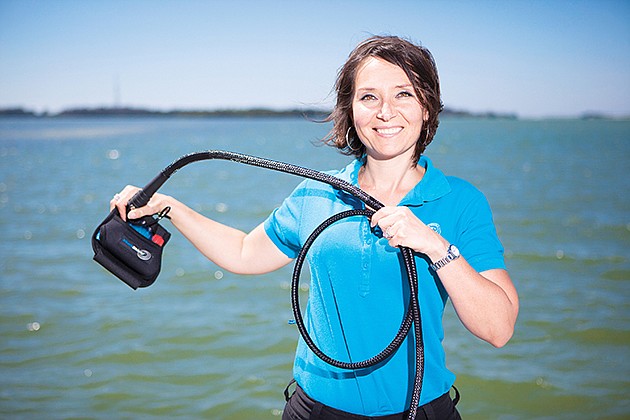- November 24, 2024
-
-
Loading

Loading

Most people do everything they can to steer clear of sharks. Amanda Wilson chases them.
In 2013, Wilson and her business partner, Lindsay Lyon, bought Shark Shield, an Australian company that makes a device that repels sharks through an electronic force field. Before Wilson and Lyon bought the firm, nearly 90% of the company's sales were in Australia. Statistically most shark attacks happen in the United States in Florida, so Wilson decided to follow the sharks to St. Petersburg.
An American living in Australia, Wilson moved back stateside and opened the U.S. office last May. In her first eight months, the company has seen a 300% increase in revenue from domestic sales, which boosted the company's overall revenue 60%. When she started, Shark Shield was in seven U.S. retailers; now it's in 50, with the majority in Florida.
Lyons and Wilson, veterans of the marine safety industry, brought an entrepreneurial mentality to the firm, which started as a research effort to control great white sharks in South Africa. The product wasn't marketed heavily to the public, and over the last decade sales have been between $800,000 and $950,000 a year. Wilson expects to reach $2.1 million in global sales 2015.
The patented Shark Shield technology consists of a small battery pack that can be strapped to a diver's ankle and a tail that drags behind with two electrodes that create an electric field. Sharks, with a sixth sense that makes them sensitive to electrical currents, experience discomfort in their snout when within 15 feet of the device. One device costs around $650.
Wilson's not going after the masses, like people at the beach. “We're focusing on the higher risk sports. Not everyone needs a Shark Shield,” she says.
Wilson targets those who are most likely to be attacked — in the United States spear fishermen make up a large percentage of that population. According to Wilson, spear fisherman in the Gulf of Mexico are seeing more and more bull sharks each time out. When a fisherman spears a fish, the blood and thrashing from the fish have actually conditioned sharks to respond, attracting sharks to the area. “Spear fishing is the lowest hanging fruit because they're more vulnerable,” she says.
In addition to divers, Shark Shield plans to focus on surfers. The firm has a patent pending on a surfboard with the fins acting as the two electrodes, so the surfer doesn't have anything hanging that could get in the way. The surfboard market is segmented, so Wilson decided to create aftermarket fin plugs and grip pads that can be added to any surfboard. Shark Shield intends to launch the new technology in the next year. Executives currently seek $1.4 million in capital to bring it to market.
With two full-time employees and one part-time, Wilson's primary sales strategy for divers in the United States is to showcase her product in person. She visits dive shops and sets up tables at spear fishing events. “It's a lot of feet on the street,” she says. “Time is the biggest challenge. There are so many dive outlets.”
The company uses the app Badger Maps to plot out all the dive shops in a targeted area and find the optimal route. They also use Google Analytics to see how many people have searched for Shark Shield in the neighborhood. Then when they walk into the store they can say, “2,000 people a month in this area are looking for Shark Shield.” The data makes a “huge impact for getting people on board,” Wilson says.
Two big sales trips for the firm are forthcoming: One is to hit 55 retail outlets in Hawaii over five days. After that there's a two-week road trip from San Francisco to San Diego. The trips will be successful, Wilson says, if Shark Shield can pick up seven stores in Hawaii and 15 in California.